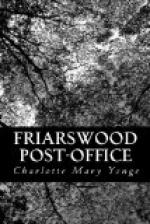‘Look sharp, Alf!’ hallooed out Harold, rushing up-stairs with the bags in one hand, and his bread-and-butter in the other. ’If you find a letter for that there Ragglesford, I don’t know what I shall do to you! I must be back in no time for the hay!’
And he had bounced down-stairs again before Ellen had time to scold him for making riot enough to shake Alfred to pieces. He was a fine tall stout boy, with the same large fully open blue eyes, high colour, white teeth, and light curly hair, as his brother and sister, but he was much more sunburnt. If you saw him with his coat off, he looked as if he had red gloves and a red mask on, so much whiter was his skin where it was covered; and he was very strong for his age, and never had known what illness was. The brothers were very fond of each other, but since Alfred had been laid up, they had often been a great trial to each other—the one seemed as little able to live without making a noise, as the other to endure the noise he made; and the sight of Harold’s activity and the sound of his feet and voice, vexed the poor helpless sufferer more than they ought to have done, or than they would had the healthy brother been less thoughtless in the joy of his strength.
To-day, however, all was smooth. Alfred did not feel every tread of those bounding limbs like a shock to his poor diseased frame; and he only laughed as he unlocked the leathern bag, and dealt out the letters, putting all those for the Lady Jane Selby, Miss Selby, and the servants, into their own neat little leathern case with the padlock, and sorting out the rest, with some hope there might be one from Matilda, who was a very good one to write home. There was none from her, but then there was none for Ragglesford, and that was unexpected good luck. If the old housekeeper left in charge had been wicked enough to get her newspaper that day, Alfred felt that in Harold’s place he should be sorely tempted to chuck it over the hedge. Ellen looked as if he had talked of murdering her, and truly such a breach of trust would have been a very grievous fault.
’The Reverend—what’s his name? the Reverend Marcus Cope, Friarswood, near Elbury,’ read Alfred; ’one, two, three letters, and a newspaper. Yes, and this long printed-looking thing. Who is he, Ellen?’
‘What did you say?’ said Ellen, who was busy shaking her mother’s bed, and had not heard at the first moment, but now turned eagerly; ‘what did you say his name was?’
‘The Reverend Marcus Cope,’ repeated Alfred. ’Is that another new parson?’
’Why, did not we tell you what a real beautiful sermon the new clergyman preached on Sunday? Mr. Cope, so that’s his name. I wonder if he is come to stay.—Mother,’ she ran to the head of the stairs, ‘the new clergyman’s name is the Reverend Mr. Marcus Cope.’
‘He don’t live at Ragglesford, I hope!’ cried Harold, who regarded any one at the end of that long lane as his natural enemy.




